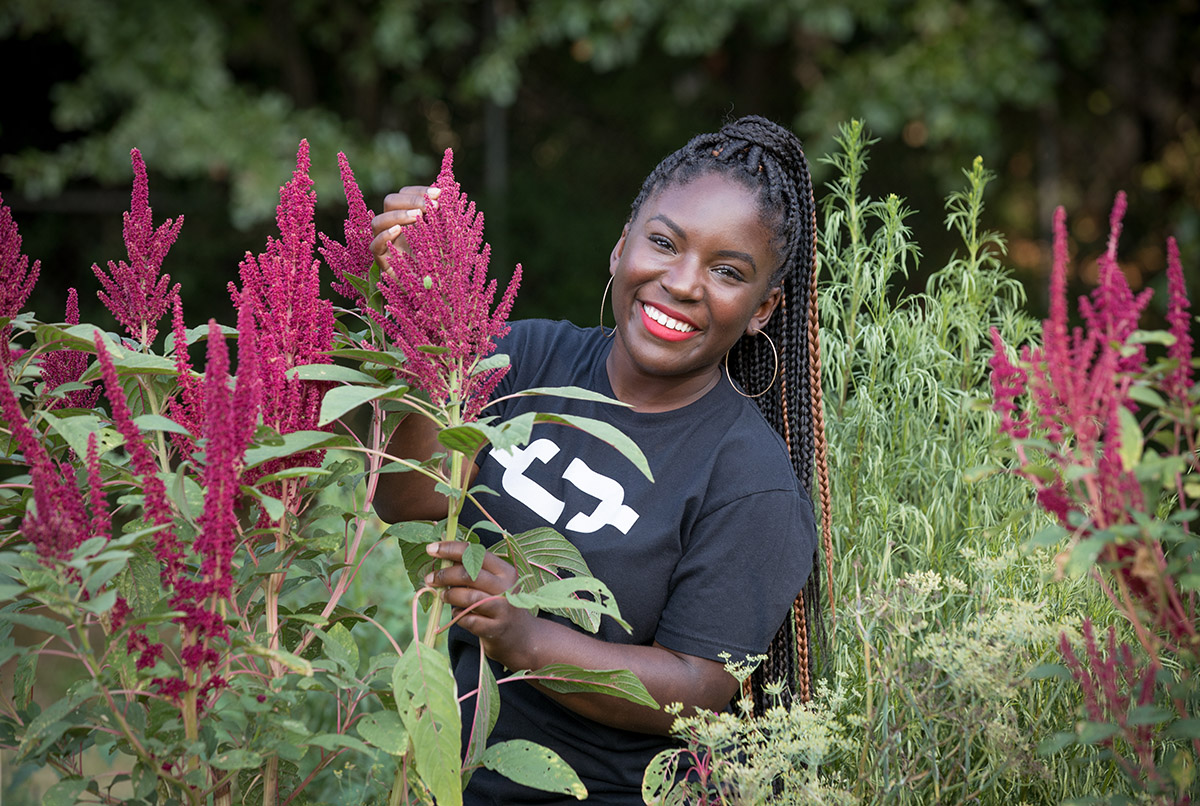Whitney Barr, first Landscape Architecture Foundation’s Honor Scholarship recipient

The boat over to Sapelo Island one morning this past summer was a living cross-section of people who live, work, or visit this unique barrier island culture: wealthy white travelers looking forward to an adventure, black students returning home from the mainland where they go to public school, local laborers en route to their site, and one avid gardener and aspiring landscape architect.
The aspiring landscape architect was Whitney Barr, a Master of Landscape Architecture candidate at UGA’s College of Environment and Design. Barr spent her summer in immersive research, planting and caring for two traditional heritage crops of the Saltwater Geechee community: red peas and sugar cane. Her work was conducted under the direction of Dr. Nik Heynen, professor of Geography and a member of UGA’s Marine Institute faculty. Heynen recently co-founded the Cornelia Walker Bailey Program on Land and Agriculture based on Sapelo.
“I wanted to fully immerse myself in the culture and develop genuine relationships with members of Sapelo’s community,” explains Barr. “I combined my love of gardening with my appreciation of the community and its history and set out to learn as much as I could about the complicated, yet beautiful story of resilience within this amazing place.” As a researcher and a black woman raised by Southern sharecroppers in South Carolina, Barr has an especially keen insight into what is meant by “community” in places often overlooked and underserved.
“I continue to be inspired by the resilience of the people of Sapelo,” she adds, “and every time I come on island, I realize that there is so much more for me to learn about this place, the African Diaspora, and our deep connections to food and land.”
Sapelo Island is about 11 miles long, and sits almost exactly half-way between Tybee Island and Jekyll Island, just south of St. Catherine’s. Unlike the highly developed tourist destinations of Tybee and Jekyll, Sapelo remains removed from the mainland. In the small community of Hog Hammock, an all-black enclave, there is one convenience store; no schools, no medical facility, and no grocery store. Residents rely on themselves for food and medicinal needs, or go to the mainland by ferry as those needs arise. Approximately 70 people reside there full-time, all of them direct descendants of West Africans who were enslaved and brought over from Africa over 150 years ago. Barr plans to make her research at Sapelo part of her thesis.
Whitney Barr is a recipient of the first Landscape Architecture Foundation’s Honor Scholarship for Inclusive Community Design, a $10,000 scholarship that supports students who have shown a commitment to underserved urban communities and who want to address community-scale design. While working for Delta Air Lines after graduating from Spelman College in Atlanta, Barr volunteered for urban garden work. She also worked as a digital marketer for a social enterprise owned by Open Hand Atlanta, a non-profit that prepares and delivers over 5000 nutritious meals a day to seniors battling chronic health conditions. Outside of the office, Whitney also reignited and led the on-site garden. Produce was used to supplement Cooking Matters and nutrition workshops with culturally-relevant crops. She plans to make a career in landscape design that is dedicated to approaching healthier food systems by creating healthy community garden systems that celebrate the African Diaspora throughout urban and rural settings. “When I was managing the produce garden in Atlanta, I became intrigued by the idea of how to get people to come to the garden and stay; not just pick up produce and leave. I wanted to learn how to design places to scale, with an understanding of how spatial definition affects a person’s experience, how we can encourage interaction and the creation of community,” Barr explains. Another way to describe this might be: social justice in social places.
“Fresh food should not be elitist. I loved doing ‘guerilla gardening’ near MARTA stations in Atlanta, planting collards, kale, and herbs in curbside niches,” she says. “And I really enjoy talking to people about how to cook the produce they buy at market.”
Barr initially turned to gardening and the search for healthy food after suffering acute endometrial pain while on a Fulbright Fellowship in South Korea. “Surgery was presented to me as my only option; now I have turned to nutrition and medicinal herbs for healing,” she says.
She loves traveling and exploring other cultures and their food ways. “I hope to bring my appreciation of food and gardening to a new level using my design skills. My time on Sapelo this past summer was both rewarding and inspiring; I will especially treasure my experience there under the guidance of knowledge of residents who welcomed me into their homes, their way of life, and their land. I constantly think back to the ways in which the late matriarch Mrs. Cornelia Walker Bailey described life on Sapelo in her memoir God, Dr. Buzzard and the Bolito Man. Experiencing life there felt surreal, and I am forever grateful.”
